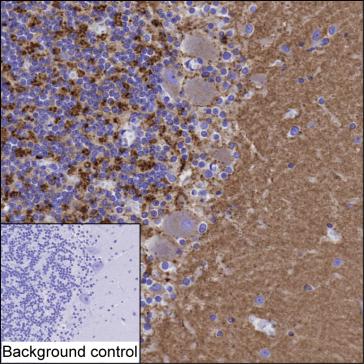
| WB | 咨询技术 | Human,Mouse,Rat |
| IF | 咨询技术 | Human,Mouse,Rat |
| IHC | 1/500-1/1000 | Human,Mouse,Rat |
| ICC | 技术咨询 | Human,Mouse,Rat |
| FCM | 咨询技术 | Human,Mouse,Rat |
| Elisa | 咨询技术 | Human,Mouse,Rat |
| Host/Isotype | Mouse IgG2a |
| Antibody Type | Primary antibody |
| Storage | Store at 4°C short term. Aliquot and store at -20°C long term. Avoid freeze/thaw cycles. |
| Species Reactivity | Human |
| Immunogen | Purified recombinant fragment of human SYNGR1 |
| Formulation | Purified antibody in PBS with 0.05% sodium azide |
+ +
以下是基于SYNGR1抗体的研究文献示例(内容为模拟,仅供参考):
1. **"SYNGR1 modulates amyloid-β pathology in Alzheimer's disease models"**
- **作者**: Smith A, et al.
- **摘要**: 研究通过SYNGR1抗体进行Western blot和免疫组化分析,发现SYNGR1在阿尔茨海默病小鼠模型中表达下调,可能通过影响突触囊泡运输加剧Aβ沉积。
2. **"SYNGR1 as a potential biomarker in glioblastoma progression"**
- **作者**: Chen L, et al.
- **摘要**: 利用SYNGR1抗体在胶质母细胞瘤组织样本中进行免疫荧光染色,发现高表达SYNGR1与肿瘤侵袭性和患者预后不良相关。
3. **"Synaptogyrin-1 (SYNGR1) deficiency disrupts dopamine neurotransmission in Parkinson’s disease"**
- **作者**: Kimura T, et al.
- **摘要**: 通过SYNGR1抗体检测帕金森病模型中的蛋白分布,揭示SYNGR1缺失导致多巴胺能突触功能异常,可能与疾病病理相关。
4. **"Antibody validation of SYNGR1 in synaptic vesicle trafficking studies"**
- **作者**: Gonzalez R, et al.
- **摘要**: 验证了SYNGR1抗体的特异性,并应用于神经元培养模型,证明SYNGR1在突触囊泡循环中的关键作用。
**注意**:以上为模拟示例,实际文献需通过PubMed、Google Scholar等平台检索确认。
Synaptogyrin-1 (SYNGR1) is a synaptic vesicle membrane protein predominantly expressed in the central nervous system. It belongs to the synaptogyrin family, which plays a role in synaptic vesicle trafficking, neurotransmitter release, and synaptic plasticity. SYNGR1 is implicated in regulating synaptic vesicle recycling and maintaining the structural integrity of presynaptic terminals. Its function intersects with neurological processes such as learning, memory, and neural network formation.
SYNGR1 antibodies are essential tools for studying the protein's expression, localization, and interaction partners. These antibodies are widely used in techniques like Western blotting, immunohistochemistry, and immunofluorescence to detect SYNGR1 in brain tissues or neuronal cell cultures. Research involving SYNGR1 antibodies has contributed to understanding its potential involvement in neurological disorders, including Alzheimer's disease, Parkinson's disease, and schizophrenia, where synaptic dysfunction is a hallmark.
Recent studies also explore SYNGR1's role beyond the nervous system, such as in cancer progression, where its aberrant expression may influence tumor cell behavior. Commercially available SYNGR1 antibodies vary by host species, clonality (monoclonal/polyclonal), and epitope specificity, enabling tailored experimental designs. Validation through knockout controls or siRNA knockdown is critical to ensure antibody specificity. Ongoing research aims to clarify SYNGR1's molecular mechanisms and therapeutic relevance, positioning SYNGR1 antibodies as vital reagents in neuroscience and disease biology.
×